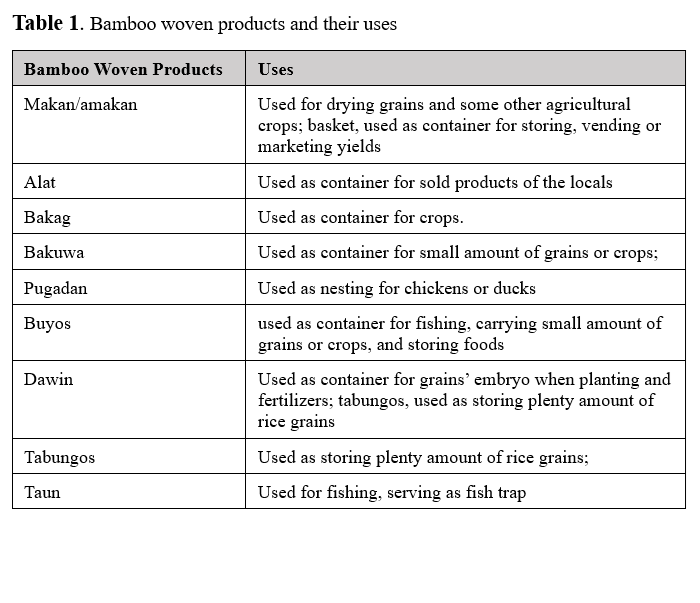Woven Livelihoods: Analyzing the Cultural and Economic Value of Bamboo Weaving in Rural Communities
DOI:
https://doi.org/10.69478/BEST2025v1n1a032Keywords:
Bamboo weaving, Livelihood, Cultural heritage, Indigenous knowledge, HandicraftsAbstract
Bamboo weaving is a culturally and economically important practice that affects the rural communities of the Philippines. This study describes and analyzes the different bamboo woven products from two communities, focusing on the socio-cultural functions and economic considerations that include traditional knowledge of bamboo weaving in Antique in Central Philippines. While bamboo weaving may still bring meaning to local economies or have connections to heritage practice, the documentation of these products and knowledge systems is unknown to the province. This qualitative study documented the various bamboo woven products and narratives from local weavers and their livelihood experiences. The results showed that there were nine major products produced by the communities, namely makan or amakan, alat, bakuwa, bakag, pugadan, buyos, dawin, tabungos and taun. The research centered on five themes: availability of raw materials; step-by-step production processes; capitalization and start-up costs, income that is derived from the finished products, marketing trends, some challenges, including limited access to markets; environmental factors (land); and lack of institutional support. The findings suggest that bamboo weaving can provide both economic sustainability, as well as be a medium for Indigenous knowledge, and environmental care. The study pointed out the significant role of the Local Government Unit (LGU) such as in undertaking programs like the establishment of a School for Living Traditions (SLT) and promoting weaving as potential local business to both assure cultural continuity and economic viability to weavers.
References
W. Połeć, D. Murawska, “The Social Constraints on the Preservation and Sustainable Development of Traditional Crafts in a Developed Society,” Sustainability, vol. 14, no. 1, December 2021, https://doi.org/10.3390/su14010120.
Y. Sun, X. Liu, “How Design Technology Improves the Sustainability of Intangible Cultural Heritage Products: A Practical Study on Bamboo Basketry Craft,” Sustainability, vol. 14, no. 19, September 2022, https://doi.org/10.3390/su141912058.
Y. Yang, M. Shafi, X. Song, R. Yang, “Preservation of Cultural Heritage Embodied in Traditional Crafts in the Developing Countries: A Case Study of Pakistani Handicraft Industry,” Sustainability, vol. 10, no. 5, April 2018, https://doi.org/10.3390/su10051336.
B. Luo, S. Ahmed, C. Long, “Bamboos for Weaving and Relevant Traditional Knowledge in Sansui, Southwest China,” Journal of Ethnobiology and Ethnomedicine, vol. 16, October 2020, https://doi.org/10.1186/s13002-020-00418-9.
A. Azhari, H. Simin, N. N. A. Nik Halman, A. Salem, N. Khairil, N. Tuah, A. Amirawa, “Issues and Challenges of Bamboo Handicraft among the Temiar Community in POS Hau, Kelantan,” International Journal of Academic Research in Business and Social Sciences, vol. 15, no. 5, May 2025, pp. 999-1010, https://doi.org/10.6007/IJARBSS/v15-i5/25423.
V. Reyes-García, T. Huanca, V. Vadez, W. Leonard, D. Wilkie, “Cultural, Practical, and Economic Value of Wild Plants: A Quantitative Study in the Bolivian Amazon,” Economic Botany, vol. 60, March 2006, pp. 62-74, ttps://doi.org/10.1663/0013-0001(2006)60[62:CPAEVO]2.0.CO;2.
B. Lee, H. Rhee, S. Kim, J. W. Lee, S. Koo, S. J. Lee, P. Alounsavath, Y. S. Kim, “Assessing Sustainable Bamboo-Based Income Generation Using a Value Chain Approach: Case Study of Nongboua Village in Lao PDR,” Forests, vol. 12, no. 2, January 2021, https://doi.org/10.3390/f12020153.
C. Trundle, T. Phillips, “Defining Focused Ethnography: Disciplinary Boundary-Work and the Imagined Divisions Between “Focused” and “Traditional” Ethnography in Health Research – A Critical Review,” Social Science & Medicine, vol. 332, September 2023, https://doi.org/10.1016/j.socscimed.2023.116108.
J. W. Creswell, “Research Design: Qualitative, Quantitative, and Mixed Methods Approach,” 4th ed., SAGE Publications, Inc.: California, USA, January 2014, https://spada.uns.ac.id/pluginfile.php/510378/mod_resource/content/1/creswell.pdf.

Downloads
Published
Issue
Section
Categories
License
Copyright (c) 2025 Loyalda T. Bolivar, Edbert Jay M. Cabrillos (Author)

This work is licensed under a Creative Commons Attribution-NonCommercial 4.0 International License.



